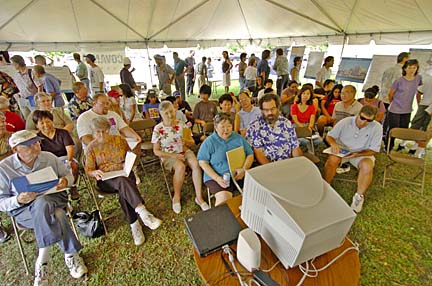

|
Plant showcases
power over trash
The city hopes to expand the
H-POWER facility to further
reduce garbage headed for landfills
More than 200 people turned out yesterday to tour Honolulu's H-POWER waste-to-energy plant and learn about its plans for expansion.
The city wants to add another boiler so it can process 720,000 tons of garbage a year -- up from the 600,000 tons a year it is handling now.
The addition of a third boiler would cost $64 million, reduce the amount of garbage going to landfills and produce more electricity.
"This needed expansion will allow us to continue to provide a reliable, proven and environmentally sound way of handling municipal solid waste for the people of Oahu," City Environmental Services Director Frank Doyle said.
Under a white tent in front of H-POWER, attendees watched a video tour of the inside of the plant and asked questions of staff members of Covanta Energy, which operates the plant. Small tour buses drove visitors on a quick exterior tour of the plant, with a Covanta manager aboard as guide.
After their tours, people ate sushi and fruit. Some commented on the fact there was no noticeable smell coming from the plant.

|
"I'm disappointed I couldn't get more intimate contact with the process," said conservation biologist Steve Montgomery. "I wanted to see the conveyor belts running. It's an amazing thing they have here."
H-POWER business manager Rodney Smith said that the number of people yesterday made walking tours impractical. He noted that smaller groups can arrange private tours by calling 682-2099.
The plant takes raw garbage delivered by city and private garbage trucks six days a week and burns 24-hours a day, 7 days a week, except for repairs and maintenance, Smith said.
The plant has operated since 1990 and has consistently exceeded its contract requirement to process 561,600 tons of raw garbage a year, Smith said.
"Since 1990 when we started operation, we've converted 9 million tons of waste into electricity -- 5 percent of the electricity used on Oahu, or enough to power 40,000 homes," plant manager Robert Webster enthusiastically told the first bus-load of visitors yesterday.
"Waste is our fuel," Webster said, and it's a renewable one. "People make waste every day, rain or shine, whether the wind is blowing or not. Today's waste is tomorrow's electricity."
Many attending the first-ever "open house" at the plant said that they also think expanding it should be part of Oahu's waste-management future.
"It's definitely the best way -- better than using the landfill," said Joe Fulton.
Herbert Chang of Moanalua said he was impressed to learn that by generating electricity with garbage, H-POWER saves Oahu 800,000 barrels of oil a year.
It also has remained well within state and federal standards for air pollution emissions, said Brian Bahor, a Covanta vice president for environmental planning.
Control room monitors of actual plant emissions yesterday reflected that record. Emissions for sulfur dioxide, carbon monoxide, particulates and opaque smoke were well within guidelines.
Doyle has told the City Council that he recommends the city buy the plant from its owners, Ford Motor Co. and Credit Corp., in addition to paying for the expansion. Full financial information on the proposal wasn't available yesterday.
Smith said yesterday that the city paid off bonds used to originally finance the plant's construction and is leasing the building back from the owners. The arrangement made financial sense for the city at the time, he said.
Covanta employs 150 workers at the plant, with a payroll of $10 million. If the city buys the plant, its intention is to continue contracting with Covanta to operate it.